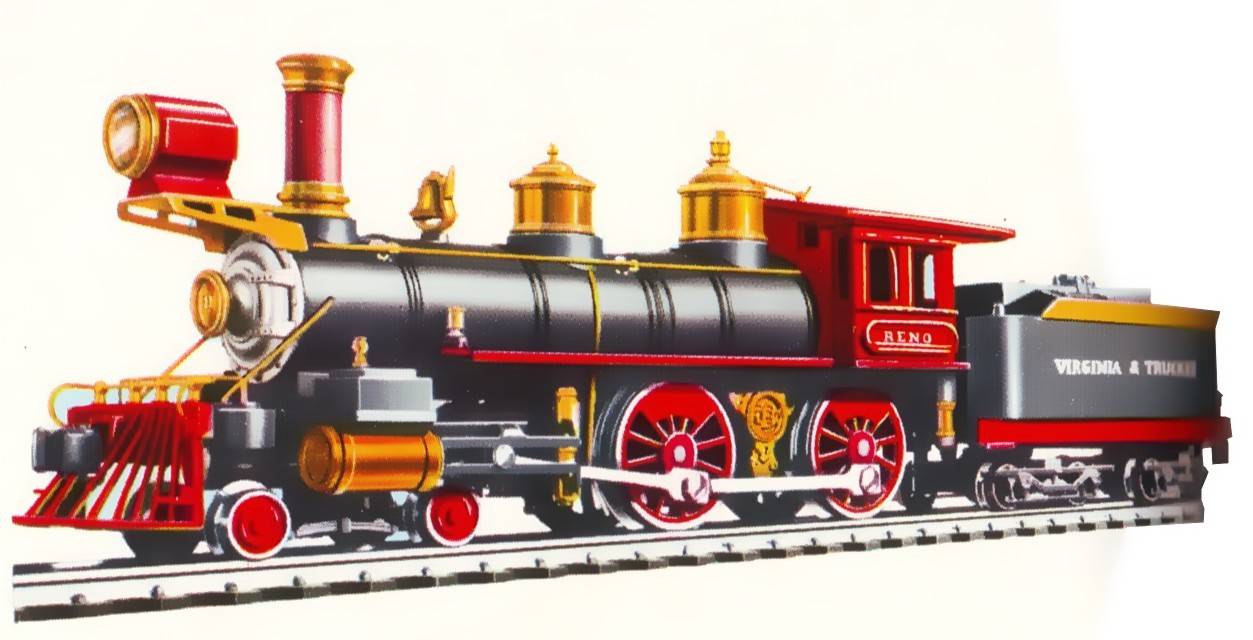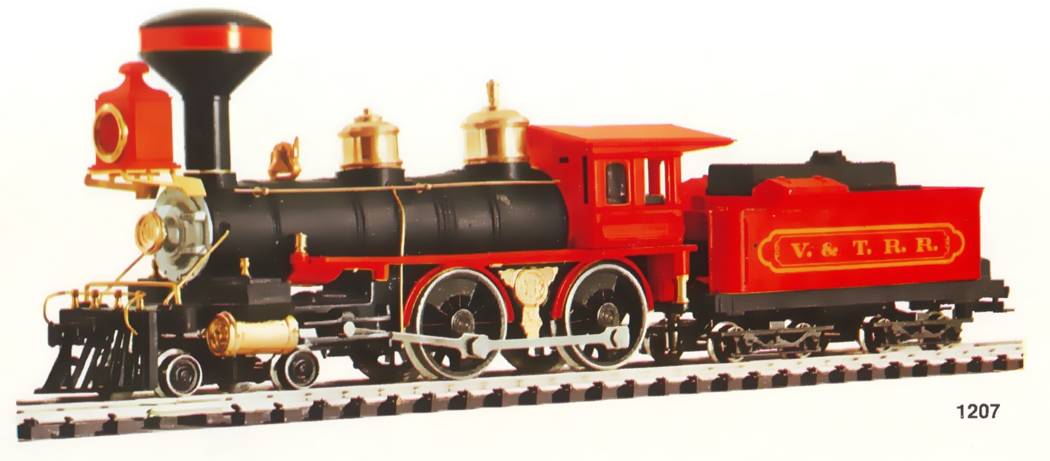

4-4-0 Steam loco American Standard - Pocher - Rivarossi
La Genoa 4-4-0 fu progettata da Arnaldo Pocher nei primi anni '60, più o meno quando la Rivarossi diventò socia della ditta Torinese. Era stata realizzata per trainare le carrozze western di fine ottocento già in catalogo.
Fu la terza delle quattro locomotive che realizzò la Pocher (CC7107 "Mistral", Bayard in ottone, Genoa e Ale 803). Le altre American, la Casey Jones e la Bowker, per quanto marcate Pocher erano progettate e prodotte da Rivarossi a Como. Verso la fine degli anni '60 la produzione dei trenini Pocher venne portata a Como e razionalizzata secondo gli schemi produttivi di Rivarossi. La Mistral e la Bayard non furono più prodotte in quanto troppo costose, la Genoa venne rivisitata e realizzata col motore cilindrico Rivarossi al posto del motore Pocher precedente e semplificandone la produzione, la Ale 803 venne prodotta solo a Como (credo) ma su progetto Pocher.
Dal 1975 tutte le locomotive ex-Pocher vennero marcate definitivamente Rivarossi.
Le differenze principali tra i vari modelli, a parte la colorazione, sono il faro anteriore e il fumaiolo che si allargava nella parte superiore per trattenere il lancio di "lapilli", difetto tipico delle locomotive alimentate a legna piuttosto che a carbone. Problema molto grave per macchine che passavano in città e paesi realizzati con edifici in legno e quindi piuttosto infiammabili. Nel modello ATSF-UP si nota anche il cow-catcher con le barre orizzontali
##########################################################
In 1830 the US were still in the Wild West age.
The construction of the railroad was carried out with a low budget, in a gradual manner, seeking routes that allowed for limited construction of bridges and tunnels (thus more economical). Even the sub ballast of the tracks was rather approximate. This mixture of limitations, also had effect of the size of the locomotives wheel arrangement, which had to be more agile than powerful.
In 1837, Henry Campbell invented 4 wheel power drive which lead to the use of the wheel arrangement 4-4-0 later known as the "American Standard” due to its wide use. . This term was soon shortened to “American” but the name “eight-Wheeler" was more approrpiate.
Between 1872 and 1873, Baldwin had constructed probably the majority of all the known locomotives in the “Far West” .
Reno, Genoa and Inyo, which are considered the most beautiful locomotives ever built, were later modified from wood burning to Oil, and are still today conserved in museums and used occasionally in the odd Western Movie.
GENOA
An exceptional reproduction of the American Locomotive type «Genoa» built in 1873 by the Baldwin Company of Philadelphia for the Virgina and Truckee Railway Company.

Length of the model 20 cm
Produced by Rivarossi froml 1975 till 1980
In the liveries of: Virginia & Truckee, Kansas City St. Louis & Chicago
Produced on a Pocher design, and also sold under the Pocher brand name from 1964/65 then marked Rivarossi from 1975 to 2001
The Genoa was the first and the only "American" made by Pocher in Torino.
Pocher version born in 1964/65 in livery V&T, code 802/2/PO. Only in USA in 1967 was issued also in Western & Atlantic livery
| codice | anno | descrizione |
| 1212 | 1975 | Locomotiva a vapore 4-4-0 Genoa Virginia & Truckee |
| 5067/02 | 1975 | Locomotiva a vapore 4-4-0 Genoa Virginia & Truckee |
| 5067/04 | 1976 | Locomotiva a vapore 4-4-0 Genoa Kansas City St. Louis & Chicago |
| 1227 | 1976 | Locomotiva a vapore 4-4-0 Genoa Kansas City St. Louis & Chicago . |
| 1213 | 1976 | Locomotiva a vapore 4-4-0 Genoa Western & Atlantic |
| 5067/03 | 1976 | Locomotiva a vapore 4-4-0 Genoa Western & Atlantic |
| 1541 | 1980 | Locomotiva a vapore 4-4-0 Genoa Baltimore & Ohio |
| 5067/06 | 1980 | Locomotiva a vapore 4-4-0 Genoa Baltimore & Ohio |
| R5416 | 2001 | Locomotiva a vapore 4-4-0 Genoa Virginia & Truckee |
| R5417 | 2001 | Locomotiva a vapore 4-4-0 Genoa Western & Atlantic |
An exceptional reproduction of the American Locomotive type «RENO» running under the Virgina and Truckee Railway Company.

Length of the model 20 cm
Produced by Rivarossi from1975 till 1979
In the liveries of: Virginia & Truckee, Kansas City St. Louis & Chicago, Western & Atlantic, Baltimore & Ohio
Produced on a Pocher design, and also sold under the Pocher brand name from 1966/67 then marked Rivarossi from 1975 to 2001
Pocher version in livery V&T, born in 1966 with code 804/2L/PO
| codice | anno | descrizione |
| 1211 | 1975 | Locomotiva a vapore 4-4-0 Reno Virginia & Truckee |
| 5070/02 | 1975 | Locomotiva a vapore 4-4-0 Reno Virginia & Truckee |
| 1203 | 1979 | Locomotiva a vapore 4-4-0 Reno Kansas City St. Louis & Chicago |
| 5070/03 | 1979 | Locomotiva a vapore 4-4-0 Reno Kansas City St. Louis & Chicago |
| R5418 | 2001 | Locomotiva a vapore 4-4-0 Reno Virginia & Truckee |
| R5419 | 2001 | Locomotiva a vapore 4-4-0 Reno Kansas City St. Louis & Chicago |
American "old time" Locomotive 4-4-0 with tender. A reproduction of the "Inyo" prototipe.
In use with the Virginia and Truckee railway Company. The name "Inyo" given to this loco, originated, just like it’s other sister Locomotives the Genoa e Reno, form the locations which the train passed through at the end of the 19th century, and at the beginning of the 20th century when serving under the «Virginia and Truckee».

Length of the model 20 cm
Produced by Rivarossi from 1973 till 1975
In the liveries of: Virginia & Truckee, Kansas City St. Louis & Chicago
| codice | anno | descrizione |
| 1207 | 1973 | Locomotiva a vapore 4-4-0 Inyo Virginia & Truckee |
| 5066/02 | 1973 | Locomotiva a vapore 4-4-0 Inyo Virginia & Truckee |
| 5066/03 | 1975 | Locomotiva a vapore 4-4-0 Inyo Kansas City St. Louis & Chicago |
| 1201 | 1975 | Locomotiva a vapore 4-4-0 lnyo Kansas City St. Louis & Chicago |
| R5420 | 2001 | Locomotiva a vapore 4-4-0 lnyo Virginia & Truckee |
| R5421 | 2001 | Locomotiva a vapore 4-4-0 lnyo Kansas City St. Louis & Chicago |
American Locomotive “Old Style” with tender. A reproduction of Locomotive nr 91 with wheel arrangement 4 4 0 “American” belonging to the Atchison Topeka and Santa Fé
Typical Locomotive which towards the end of the 19th Century was used by the Company to haul passenger trains, and good trains on the central routes of the US. The model respects the original paint scheme and decoration of the prototype.

Length of the model 22 cm
Produced by Rivarossi on 1976
In the livery of: Atchison Topeka Santa Fe
| codice | anno | descrizione |
| 1206 | 1976 | Locomotiva a vapore 4-4-0 American Atchison Topeka Santa Fe |
| 5068/E | 1976 | Locomotiva a vapore 4-4-0 American Atchison Topeka Santa Fe |
| 5423 | 1999 | Locomotiva a vapore 4-4-0 American Union Pacific |
| 5422 | 1999 | Locomotiva a vapore 4-4-0 American Atchison Topeka Santa Fe |